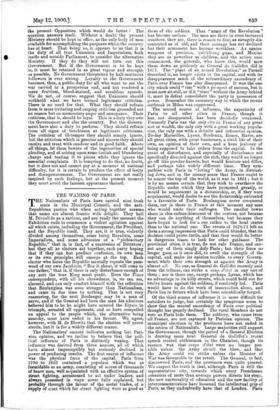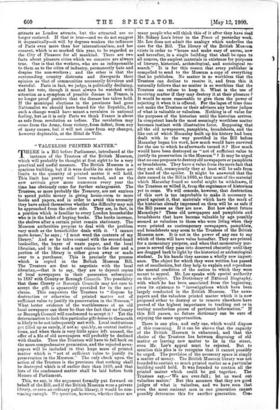THE WANING OF PARIS.
THE Nationalists of Paris have carried nine fresh seats in the Municipal Council, and the anti- Republican parties who when acting together assume. that name are almost frantic with delight. They hail M. Deroulede as a saviour, and are ready the moment the Exhibition ends to commence a violent agitation against all which exists, including the Government, the President, and the Republic itself. They are, it is true, violently divided among themselves, some being Royalists, some Imperialists, and some advocates of a " plebiscitary Republic," that is, in fact, of a succession of Dictators ; but they all as electors act together, each party hoping that if they can but produce confusion, its own man or its own principles will emerge at the top. Each elector who hates the Republic mentally repeats the pass- word of our own Jacobites, " Box it about, it will come to our father," that is, if there is only disturbance enough of any sort the true King must profit. Even the Times correspondent, with all his shrewdness, is, we can see, alarmed, and can only comfort himself with the reflection that Bonlangism was even stronger than Nationalism, and came in due time to nothing. That is not very reassuring, for the next Boulanger may be a man of nerve, and if the General had been the man his admirers believed him to be he might have entered the Epee in triumph, arrested all opponents, and so have compelled an appeal to the people which, the alternative being anarchy, must have ended in his favour. We agree, however, with M. de Blowitz that the election will prove sterile, but it is for a widely different reason.
The Nationalists' success indicates nothing but Pari- sian opinion, and we incline to believe that the poli- tical influence of Paris is distinctly waning. That influence was derived from three sources, all of which have almost imperceptibly but seriously declined in power of producing results. The first source of influence was the physical force of the capital. Paris from 1790 to 185-2 contained a populace which was as formidable as an army, consisting of scores of thousands of brave men, well acquainted with an effective system of street fighting, accustomed to act under leaders, and always possessed in ways never fully explained, but probably through the favour of the metal trades, of a supply of arms which for street fighting were as good as those of the soldiers. That "army of the Revolution" has become useless. The men are there in even increased numbers, they are, there is reason to fear, as savagely die contented as of old, and their courage has not declined but their armament has become worthless. A s againa weapons of precision, quickfiring guns, and Maxim they are as powerless as children, and the action elm commenced, the generals, who know this, would mow them down as pitilessly as General de Galliffet did in 1871. The " plant of an armed Revolution," as Parnell described it, no longer exists in the capital, and with its disappearance much of the extraordinary ascendency of Paris over France has also disappeared. It was the one city which could " rise " with a prospect of success, but it must now sit still, or if it "rises" without the Arm/behind it, must in defeat consolidate the party in possession of power. Remember the summary way in which the recent outbreak in Milan was suppressed.
The second source of influence, the superiority of Paris to all other cities in France, though it has not disappeared, has been decidedly weakened. Formerly Paris was the only city in France of any great size or wealth, the only city with a great working popula- tion, the only one with a definite and influential opinion. To-clay Marseilles, Lyons, Bordeaux, Rouen, Havre, are all great cities, with great businesses, a vivid life of their own, an opinion of their own, and a keen jealousy of being supposed to take orders from the capital. In the event of disturbance, and especially of disturbance not specifically directed against the rich, they would no longer go off like powder-barrels, but would hesitate and differ, and perhaps take widely different lines. They sym- pathise with Paris in " loving " the Army, in distrust- ing Jews, and in the uneasy sense that France ought to be nearer the top of the world, as it was in 1861 • but it is by no means certain that they wish to overthrow the Republic under which they have prospered greatly, or would be acquiescent is a dictatorship, or, if they were acquiescent, would desire to see the dictatorship entrusted to a favourite of Paris. Boulangism never conquered them, nor is there in France at this moment any man who would unite their suffrages. The smaller towns share in this enfranchisement of the centres, not because they can do anything of themselves, but because they have begun to look for a cue rather to the local centre than to the national one. The events of 1870-71 left on them a strong impression that Paris could blunder, that its decision could prove futile, and that they would do better in dangerous times to look for other guidance. The provincial cities, it is true, do not rule France, and can- not any of them singly defy Paris ; but their force no longer goes, as it once did, to swell the strength of the capital, and make its opinion terrible to every Govern- ment, while their own strength as against the Army is almost nil. No one, as General de Galliffet recently said from the tribune, can strike a coup d'etat in any one of them ; nor is there one, except perhaps Lyons, which has an advantage in its hilly streets, which could hold out for twelve hours against the soldiers, if resolutely led. Paris would have to do the work of insurrection alone, and Paris lies in fetters which have been scientifically forged.
Of the third source of influence it is more difficult for outsiders to judge, but certainly the symptoms seem to show that the mental ascendency of Paris over political thought has greatly declined. The rural Members do not vote as Paris bids them. The soldiery, who come from all France, are not captured by Parisian opinion. The municipal elections in the provinces have not ended in the return of Nationalists. Large majorities still support the Government, though the period of a General Election is drawing more near. General de Galliffet's recent speech created enthusiasm in the Chamber, though its essence was that coups d'elat were no longer pos- sible unless the Army struck the blow, and that the Army could not strike unless the Minister of War was favourable to the revolt. The General, in fact, discrowned Paris, and the provinces were quite pleased. We suspect the truth is that, although Paris is still the representative city, towards which every Frenchman conscious of more than average powers directs his steps, the new universality of education and the new facility of intercommunication have loosened the intellectual grip of Paris, as they undoubtedly have that of London. Paris attracts as London attracts, but the attracted are no longer enslaved. If that is true—and we do not suggest it dogmatically—it will by degrees weaken the influence of Paris even more than her internationalism, and her consent, which is so marked this year, to be regarded as the City of Pleasure for all mankind. There are two facts about pleasure cities which we conceive are always true. One is that the workers, who are as indispensable to them as to the cities of industry, permanently hate and despise the non-workers ; and the other is that the surrounding country distrusts and disregards their opinion as that of communities necessarily frivolous and wasteful. Paris in fact, we judge, is politically declining, and her vote, though it must always be watched with attention as a symptom of possible disease in France, is no longer proof positive that the disease has taken hold. If the municipal elections in the provinces had gone Nationalist we should have feared for the Republic, for such a change would have meant a revulsion in national feeling, but as it is only Paris we think France is about as safe from revolution as before. The revolution may come from the Army, from victory, from defeat, from any of many causes, but it will not come from any changes, however deplorable, at the Hotel de Ville.







































 Previous page
Previous page